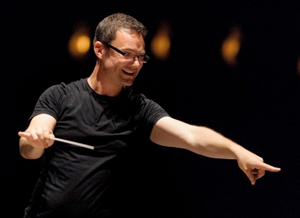by David Kulma

Although he began composing it in 1782, Mozart never completed the work. It has no Agnus Dei, the second half of the Credo is missing, and multiple movements lack full orchestration. The edition played on Friday evening is from 1986 by Helmut Eder and includes the Kyrie, Gloria, the two Credo sections, and the Sanctus/Benedictus pairing. Taking so much effort to bring this incomplete work to life may seem strange, but after hearing this performance — especially the shining solo work by soprano Joélle Harvey and mezzo-soprano Krisztina Szabó — it clearly features some of Mozart’s most memorable music.
Throughout the evening the Blossom Festival Chorus, prepared by Lisa Wong, sounded glorious — brooding and imposing in the dark sections and eminently clear in the many fugues that crop up along the way. Hall drew both heavenly, soft dynamics and celebratory, full-throated fortes out of both ensembles. The precision of the continuous double-dotted rhythms in the Gloria’s “Qui Tollis” was stunning. Tenor Paul Appleby and bass-baritone Michael Sumuel sounded wonderful in the small amount of music they sang, but the real stars of the evening were Harvey and Szabó.
Harvey sang with glorious restraint in the major-keyed “Christe eleison,” while Szabó’s full-bodied tone was fantastic in the “Laudamus Te,” featuring precise and delightful fiorituras. The two came together splendidly during the moving “Domine Deus” of the “Gloria,” while Harvey’s solo in the wind-dominated “Et Incarnatus Est” of the incomplete Credo was the most memorable. Her light, agile singing showed off her lovely phrasing and extraordinary control. Flutist Joshua Smith, oboist Jeffrey Rathbun, and bassoonist John Clouser matched their singing lines with loveliness.
Ending with exhortations of “Hosanna in excelsis,” Hall and company made the secular temple of Severance Hall ring with Mozart’s stunning sacred music. It made one forget about the missing “Agnus Dei” and its petition for granting peace.
Published on ClevelandClassical.com August 20, 2019.
Click here for a printable copy of this article


